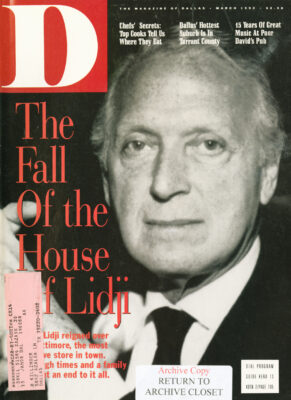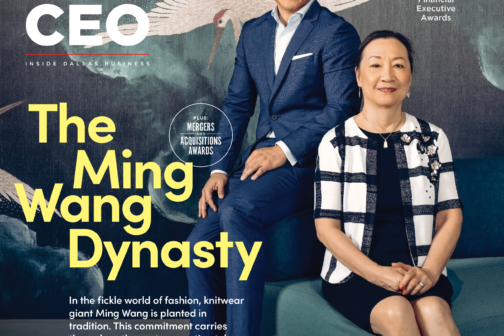IT IS JANUARY 2, TWO DAYS after the turning of the new year. Inside Poor David’s Pub on Lower Greenville, limp paper snowflakes hang above small piles of swept trash, stacks of chairs and empty tables. A banner reading Happy New Year stretches across the bar. Framed by these symbols of time’s passage, owner David Card stands behind the bar and fumbles in the cash register.
“We didn’t sell out,” he says of the New Year’s Eve bash that featured blues guitarist Bugs Henderson. “Got close, though.”
Card pays exceedingly close attention to the finances of his club. He keeps the books, sets the guarantees for the bands, prices the drinks, even oversees the purchases of beans for nachos. He admits his obsession. “Sometimes the business side and the artistic side compete,” he allows. “But if you don’t pay attention to the bills you go broke and there’s no art.”
A short, trim, athletic man with a craggy bearded face and a volatile temperament. Card has reached an artistic milestone: On March 15, Poor David’s Pub will celebrate its 15th anniversary. “Poor David’s is the second-longest-running continuously owned club in Texas, second only to Antone’s in Austin,” says Card in a mild boast.
Card is permitted his pride. Poor David’s is a Dallas institution. A small, unpretentious club that holds 300 people at wooden tables and padded metal chairs, some of them so worn that their stuffing is exposed, the club has survived by being an anachronism, a throwback to the coffeehouse milieu of the late 1950s and early 1960s. Eschewing musical fads (punk, new wave, rap) and social trends (the singles scene), Poor David’s, with its singer/songwriters who usually work within an established folk, blues or country tradition, has remained stalwart in the storms that have roiled around it. “I always wanted to be the antithesis of what Dallas is: pretension and glitz,” says Card. “I wanted a place that was simple and comfortable.”
On the walls is a veritable rogues’ gallery of performers who’ve played the club over the years. “That’s Ray Wylie Hubbard,” says Card, gesturing toward the photo closest to the door as he embarks on a sentimental journey. “Clarence ’Gatemouth’ Brown. Steve Fromholz. He was the first big performer I ever booked. Peter Yarrow. John Vandiver. He was murdered in ’85. Roger McGuinn. Doc Watson.” He comes to the bar and points behind it to an autographed picture of Tom Landry and says, smiling. “We sent him a letter about what a good example we thought he set and he sent that in return. As far as I know he’s never been in the club.” He resumes. “Jerry Jeff Walker, Odetta- that’s taken at Kerrville, but she played here.” He comes to a black-and-white photo of three young men playing acoustic guitars. “That’s me in ’62 with a group I was in at UD called the Wanderers. 1962.” He sighs. “Long time ago.” He studies the photo for a moment. “Notice anything about that picture? No microphones. That was just before folk became electric.” He shakes his head, as if shaking off memories too personal to remember, then continues. “John Hammond, the great John Hammond, playing with Josh Alan. Riders in the Sky, 1983, before they got big. Bill Hearne, that was September 1990-he and Bonnie [Hearne] recently cut the first ’Live at Poor David’s’ recording. Gary P. Nunn-he just recorded the second one. Leo Kottke, Tom Paxton, Jesse Colin Young, John Sebastian, John Lee Hooker, Sara Hickman-that’s 1984; she did her first live performance at Poor David’s. I reminded her of it the other day. You’d think you’d remember where your first show was. Albert Collins. Stevie Ray Vaughan. He wasn’t booked, he just showed up and jammed with Anson [Funderburgh] and I hurried back, got my camera and snapped that picture. B.W. Stevenson. John Hartford. He played the first night of the first weekend of this Poor David’s, March 18, 1983. Jerry Jeff Walker; he played the next night. Dr. John, Richie Havens, Lu Mitchell-“the grandmother of Dallas folk music”-the Roches, Mary Travers, Delbert McClinton.” Then there are the performers he doesn’t have pictures of, like Los Lobos and Bo Did-dley, not to mention the artists whose faces on this photographic memory tour went by too quickly to write down.
David Card, 51, didn’t plan to go into the nightclub business. It just sort of happened. A native of Flint, Mich., Card moved to Dallas after his father, who was divorced from his mother and living in Fort Worth, offered to pay his way through the University of Dallas. David took him up on his offer and graduated in 1962 with a bachelor’s in philosophy, whereupon he joined the Marines. “I wasn’t into the military or anything,” he reflects. “I just needed to fulfill my military obligation.”
After his discharge, he took a job with the A.C. Nielson ratings firm doing market research in its food and drug division. In 1968, he returned to the University of Dallas and earned an MBA. He went to work as a computer salesman for IBM and quit in 1971. “I wasn’t cut out for the corporate world,” he says.
Problem was, he wasn’t sure what he was cut out for. Most days, he could be found hanging around a neighborhood bar in Oak Lawn called Bo’s Place. He was there so much he decided to buy in as part-owner. Eventually, he bought out his partner. Seeking ways both to solidify and expand his clientele, Card sponsored such things as darts tournaments and hat nights (discounted drinks for anyone who wore a hat). And on Wednesday nights, he had a “talent search” in which three acts would perform and a vote by the patrons would determine the best; that act would compete in a final competition several weeks later.
On these nights, Card noticed some-thing: Music drew a patronage that didn’t just come to drink. Or, as Card puts it: “With music, you don’t have as many drunk assholes.”
In late 1976, he left Bo’s Place and bought a bar on McKinney called Eton Run. Not wanting to be saddled with loan payments, he used his entire savings to pay for it. In March, as the time drew near to renew his liquor license, which meant putting a name on the form, Card looked at the “publike” atmosphere of his small, dark bar-it held about a hundred people-and at his financial condition and came up with the moniker, Poor David’s Pub.
After a few years of booking local bands, Card plunged into the big time. Well, the medium time. After much debating with himself, he decided to risk what then seemed a fortune-$200 per night-on a three-night weekend stand with Steve Fromholz. When the gig turned a profit, it marked a turning point for Card that sticks in his mind to this day. “It was a pivotal weekend,” he says. “I learned that people were willing to pay to see quality. It also turned me on to the Austin scene and vice versa.”
Card started branching out. He strengthened his longstanding ties to the Kerrville Folk Festival-he booked their acts, which put him on the national map-and he started booking more blues. With his lease about to expire at the McKinney location, Card wrangled a deal at his current spot on Lower Greenville. Over several months, employees and patrons helped him bash down walls, erect the bar and construct a tiny office/ dressing room in the back. His wife, Clare, who met Card while she was a student in a small-business management class he taught at El Centro College between 1978 and 1983, remembers him bolting out of the house on Christmas Day, 1982, to work on the new club. “It was just time in the schedule to do it, I guess,” she says, as she recalls wandering into the club that day to find Card hard, if fruitlessly, at work. “David isn’t very mechanically inclined,” she says. “And when I went down to the club, I saw him standing on a ladder banging at the wall with a chisel, trying to make a back door. I went over to my daddy’s and got a sledge-hammer.”
Meanwhile, Card continued his experiment in eclecticism. He remembers hiring the now-defunct Austin rhythm-and-blues group, the Cobras, on a Wednesday night. The place was packed and bar sales were phenomenal. As a result, he started booking more high-octane acts, such as Bo Diddley, Los Lobos (who blew out one of the club’s speakers) and the late blues harmonica player Paul Butterfield (whom Eric Clapton, in town for a gig, came out to see).
Today, Card calls his club “a cross between the Cactus Cafe and Antone’s,” two Austin venues, the former folk-oriented and the latter all blues. As with both those clubs, Poor David’s has earned a reputation as a premier listening room. “Without alienating the other clubs in town,” says guitarist Bugs Henderson (who once dueled on stage at Poor David’s with Ted Nugent), “it’s my favorite place to play in Dallas. There are bigger rooms to play and rooms where you can make more money, but Poor David’s is a listening room. I can do more subtle stuff there. People aren’t there to pick up women or get blasted, they’re there to listen to the music.”
The praise for Card the club owner does not automatically extend to Card the person. Though he can be charming and is regarded by friends as intelligent, he has a reputation for being difficult, standoffish and a tightwad. Even those who like him acknowledge his darker traits. “He can be moody and his demeanor can be off-putting for people who don’t know him,” says Cathy Gould, who coordinates the Tuesday night talent showcases which feature up-and-coming new artists. “He’s what I call a cactus person: prickly on the outside, soft on the inside. Part of what I do is explain him to people.” Even his wife concurs, relating her experience as the former purchaser of liquor and food for the club. “He’ll argue with you,” she says. “He can be gruff and short-tempered. He sometimes flies off the handle and makes you feel you’ve done something wrong. But he’s always the first to apologize.”
Those close to him say he’s also a worry-wart, especially about the club, and that he has energy to burn. He jogs every day, plays basketball, snow skis, dives, sometimes still plays guitar (though not as much as he used to since his favorite guitar was stolen from his car a few years ago) and reads voraciously. Still, although he shows few signs of slowing down, friends say he has mellowed, particularly since having kids. Card didn’t marry until his mid-40s. “I wanted it to be real,” he says. “I didn’t want the same bad situation my parents had.” He has a 14-year-old stepson from Clare’s previous marriage and has fathered two children, a 6-year-old boy and a 5-year-old girl.
Card has toyed with the idea of retiring from the club business. Indeed, sometimes either the weight of the past or his concerns about the future seem to burden him. Several months ago, as he contemplated the club’s upcoming 15th anniversary, he found himself suffering from mild depression. He was worried, he says, about stiffer competition in the club scene and about staying vital. But Poor David’s does not appear in immediate danger of fossilizing. While he prepares for his March 15 anniversary show, a benefit for the Texas AIDS Network, he continues to seek and book new faces, such as Christine Lavin, David Wilcox, Josh Alan, Robert Earl Keen Jr., Trout Fishing in America and the Dixie Chicks.
And lest there be any doubt, Card seems to be in it for the long haul. “I don’t know what else he’d do,” says Clare. “I don’t expect him to ever stop worrying about the club. After the 15th, he’ll do the same thing he’s always done. Book bands.”
“Well.” says Card. “I do have another 13 years on my lease.”
Related Articles

Dallas 500
Meet the Dallas 500: Mike Tomon, Co-President and COO of Legends Hospitality
The exec talks about Legends' long term partnership with Real Madrid, his leadership strategies, and the pet alligator he had in college.
By Ben Swanger

D CEO Award Programs
Winners Announced: D CEO’s Financial Executive Awards 2024
Honorees in this year’s program include leaders from o9 Solutions, Baylor Scott & White, and Texas Capital, as well as our Constantine ‘Connie’ Konstans Award winner Mahesh Shetty of ILE Homes.



